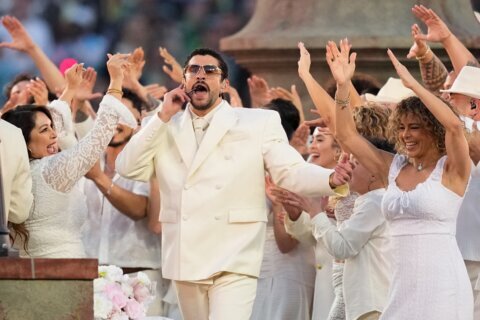WASHINGTON — Darren Aronofsky remains one of our greatest filmmakers of the 21st century. Not only does he have three masterpieces to his name — “Requiem for a Dream” (2000), “The Wrestler” (2008), “Black Swan” (2010) — even his more convoluted misfires at least deserve praise for their groundbreaking guts, visionary ambition and cinesthetic skill.
So it’s with burning anticipation that his new chiller “mother!” arrives with a bizarre title that captures the experience of watching it: opening with slow-burn suspense (lower-case) before all hell breaks loose (exclamation!). The result is bound to divide critics and audiences alike with a genius allegory that is sadly lost in an opaque, chaotic and distasteful presentation.
The story follows a creative poet (Javier Bardem) and his earthy wife (Jennifer Lawrence), who live in a secluded Victorian fixer-upper. He spends his days battling writer’s block, while she spends most of her time renovating the place. That is until they open the door to mysterious strangers (Ed Harris and Michelle Pfeiffer), who gradually fill then destroy their quiet paradise.
I’ve never seen a crowd enter with such expectations and exit with such repulsion. There will be viewers who hate it, appalled by the disturbing finale. There will be others blown away when the allegory finally clicks. Yours Truly was neither; rather, I actively dueled with the director’s divine symbols every step of the way, grasping the “ribbing” early on, cringing at the hamfisted hints, then lamenting that it was executed with such disregard for an audience.
If you despise SPOILERS, proceed with caution; “mother!” is one of those flicks that you’ll enjoy more with a little fair warning. You ready? The film tells the entire Bible in two hours. Move over, John Huston. It’s Aronofsky’s “bible!” The idea was likely planted during “Noah” (2014), which opened with a storybook Garden of Eden prelude. Aronofsky supposedly wrote “mother!” in six days (on the seventh day, he rested). Good luck showing it in Sunday school.
Here’s a sampling of the clever Biblical elements woven into the movie’s hidden second level:
God: Javier Bardem is the Creator. His name in the credits reads “Him.” There’s a telling shot looking up at him on the third floor that quite literally paints him as “The Man Upstairs.” Thus, his writer’s block is God’s struggle creating; his unfinished story the Old Testament; and his ultimate masterpiece the New Testament, a tale of a sacrifice that connects with the masses.
Mother Nature: Jennifer Lawrence is Mother Nature. This explains why she can feel the beating heart of the house and tends to its bloodstains. As the film progresses, her neat, tidy home is overpopulated by rowdy humans, who destroy, pollute and defile her precious floors. One guest (Jovan Adepo) even repaints the walls, just like humans paving over dirt terrain.
Adam & Eve: Ed Harris is Adam, fittingly an orthopedic surgeon. After a walk with Bardem, Harris’ rib is missing (shown briefly in a bathroom glimpse). Right after, Michelle Pfeiffer pops up as Harris’ mate Eve. It’s great seeing Pfeiffer back in the type of mischievous role that she played in “What Lies Beneath” (2000). Together, their screen credits read Man & Woman.
Tree of Knowledge: Bardem shows Harris a mystical crystal in his office, instructing him not to touch, just like God telling Adam not to eat the forbidden fruit on the Tree of Knowledge. As you might expect, Pfeiffer seduces Harris to break the crystal, just like Eve tempting Adam to eat the apple. Immediately, Bardem is thrown into a rage, boarding up the room and forbidding them to reenter, while Pfeiffer and Harris have sex in their new “sin nature.”
Cain & Abel: Soon, two brothers barge into the house arguing over inheritance (played by real-life siblings Domhnall and Brian Gleeson). One kills the other just like Cain & Abel.
Noah’s Flood: During Abel’s funeral, the rowdy guests burst a kitchen pipe, flooding the room. This is obviously Noah’s Flood, in which Aronofsky previously cast Russell Crowe. In “mother!” it’s ironically the most subtle of his Biblical symbols. Just don’t expect Moses & Pharaoh, David & Goliath or Samson & Delilah. Missed opportunities abound in the race to the Messiah.
Nativity: After Lawrence reveals she’s pregnant, she gives birth to a Christ child as worshipers bring gifts (Three Wise Men). This would have been a better midpoint than a climax, allowing the child to grow into an inspiring young adult at the time of his sacrifice, perhaps even betrayed by a Judas like Dragline in “Cool Hand Luke.” Instead, the newborn’s demise is shocking, unless you recall that Catholics eat wafers every Sunday (“The body of Christ”).
Apocalypse: The entire thing builds to an abstract final act where chaos envelops the house, from warzone explosions to terrorist executions to Kristen Wiig as Bardem’s ecstatic publicist preaching the Gospel like a modern evangelical. You might wonder why Christ’s birth happens so close to Armageddon, but some theologians believe that we’re already living in the end times. Either way, the entire house goes up in flames as Mother Earth is destroyed by fire.
Renewal: In the cyclical resolution, Lawrence emerges from the rubble and gives Bardem her heart, containing a replacement crystal to rebuild the house anew. It’s the circle of life.
These Biblical references make for juicy (if occasionally telegraphed) dialogue of double meanings. The opening line “baby” may seem like Lawrence calling Bardem a pet name, but really it’s a reference to the coming Christ child. Later, she tells him, “I’ll go get started on the apocalypse,” referring to cleaning up the living room, when really it’s literal Armageddon.
The problem is that this symbolism is disconnected from the A-Story. For every symbolic element, there should also be a surface reason for each event to occur. While it makes symbolic sense that Harris & Pfeiffer disappear (i.e. Adam & Eve), there is no plot reason; they just vanish. And while it makes symbolic sense that the bloody brothers arrive and duke it out in the living room (i.e. Cain & Abel), it comes out of nowhere as a random, forced plot device.
Also problematic is that Aronofsky turns J-Law into one of the most passive protagonists in recent memory. In “Rosemary’s Baby” (1968), Mia Farrow actively dumped her tannis root, solved Scrabble anagrams and moved secret dressers, but Lawrence spends the entire film helplessly reacting to those around her. While Farrow raised the child, J-Law loses it in her sleep. In a year of strong female leads, Wonder Woman just became Blunder Woman.
Yes, she’s Mother Earth and thus at the mercy of mortal intruders, but right then and there, the movie is intrinsically serving the allegory rather than the story, choosing thematic layers over character development and forward plot momentum. Aronofsky should let audiences in on the secret a little more, rather than keeping the whole experiment so indulgently esoteric.
You can tell the studio is worried, evidenced by the Garden of Eden graphics suddenly added to the poster. But all the marketing tricks and dating rumors in the world won’t cover the fact that the surface experience doesn’t rise to the level of the subsurface one. First impressions matter, but Aronofksy doesn’t bridge the disconnect. He spends so much attention on the symbolic layer that you can hear the A-Story plot cry out, “Why hast thou forsaken me?!?”
Instead, it all feels reverse engineered. Yes, every film is conceived this way so that writers know the ending before they write the beginning. But in this case, audience appreciation for the film must also be reverse engineered, which is a problem. This isn’t a riveting ride that later reveals itself to be symbolic (i.e. “Rear Window,” “The Godfather,” “Rosemary’s Baby”); it’s an offputting first watch that defeats the purpose of drawing viewers in for repeat viewings.
In the end, if you hail “mother!” as a 4-star masterpiece, you’re not discerning enough. Folks deserve to enjoy the experience. Conversely, if you brand “mother!” a 1-star flop, you’re not looking close enough. Directors deserve to experiment. Call it “The Fountain” all you want, but I’d rather see a visionary whiff swinging for the fences than lazily lay down blockbuster bunts.
Which brings us to the true tragedy of this missed opportunity. Slow-burn, symbolic attempts like “mother!” are always more engaging and haunting than surface-level creepers like “It,” and yet, the latter is already getting better reviews and will likely get better box office. That’s because Aronofsky’s risky, ambitious approach comes with a much smaller margin for error.
If you come at the King — be it Stephen King or the King of Kings — you best not miss.








